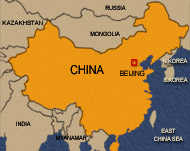Chinese tycoon gets 18 years in $84.5m fraud
Tycoon Yang Bin, once listed by Forbes magazine as China’s second richest man, began an 18-year jail sentence on Monday for crimes involving fraud and bribery.

The Chinese-Dutch entrepreneur’s spectacular fall from grace has sent shock waves through the international financial communities.
Yang, picked by North Korea last year to run a short-lived free trade zone that was to mark the Stalinist state’s bold jump into capitalism, was also fined 2.3 million yuan (280,000 US dollars).
The charges against Yang related to his property and horticultural business and included falsification of documents, fraudulent contracts, illegal land use and bribery.
According to a recent issue of the Securities Market Weekly, Yang took out 700 million yuan (84.5 million dollars) in fraudulent loans and forged some 1.7 billion yuan in phony receipts to get his company listed.
Offshoots of Yang’s flower and property development company Euro-Asia Agricultural (Holdings) Co. Ltd. were also heavily fined.
The businessman’s aunt, Yang Fenglin, who now runs his crumbling empire, said he would appeal.
“He was accused of six offences,” she said. “It is too heavy a sentence and unfair. Yang Bin says he will appeal immediately.”
Flower king
 |
|
Yang was symbol of being |
Forbes ranked the 40-year-old Yang, known as the flower king, as China’s second richest man in 2001 with an estimated fortune of 900 million dollars.
His demise began last October when he was placed under house arrest just weeks after being picked by Pyongyang to head the regime’s ambitious Sinuiju Special Autonomous Region, which borders China.
Yang reportedly took the job to escape justice in China, aware that his time was running out.
Since his arrest, the bizarre plan for Sinuiju, which would have involved replacing much of its population with skilled workers and walling the city off from the rest of the hermit state, appears to have ground to a halt.
The case against Yang triggered widespread attention because it raised the question of whether or not it was really “glorious” to get rich in modern China, as stated in a memorable phrase coined by late patriarch Deng Xiaoping.
Born in the eastern city of Nanjing to a poor family, Yang moved to the Netherlands in the 1980s but later returned to China.